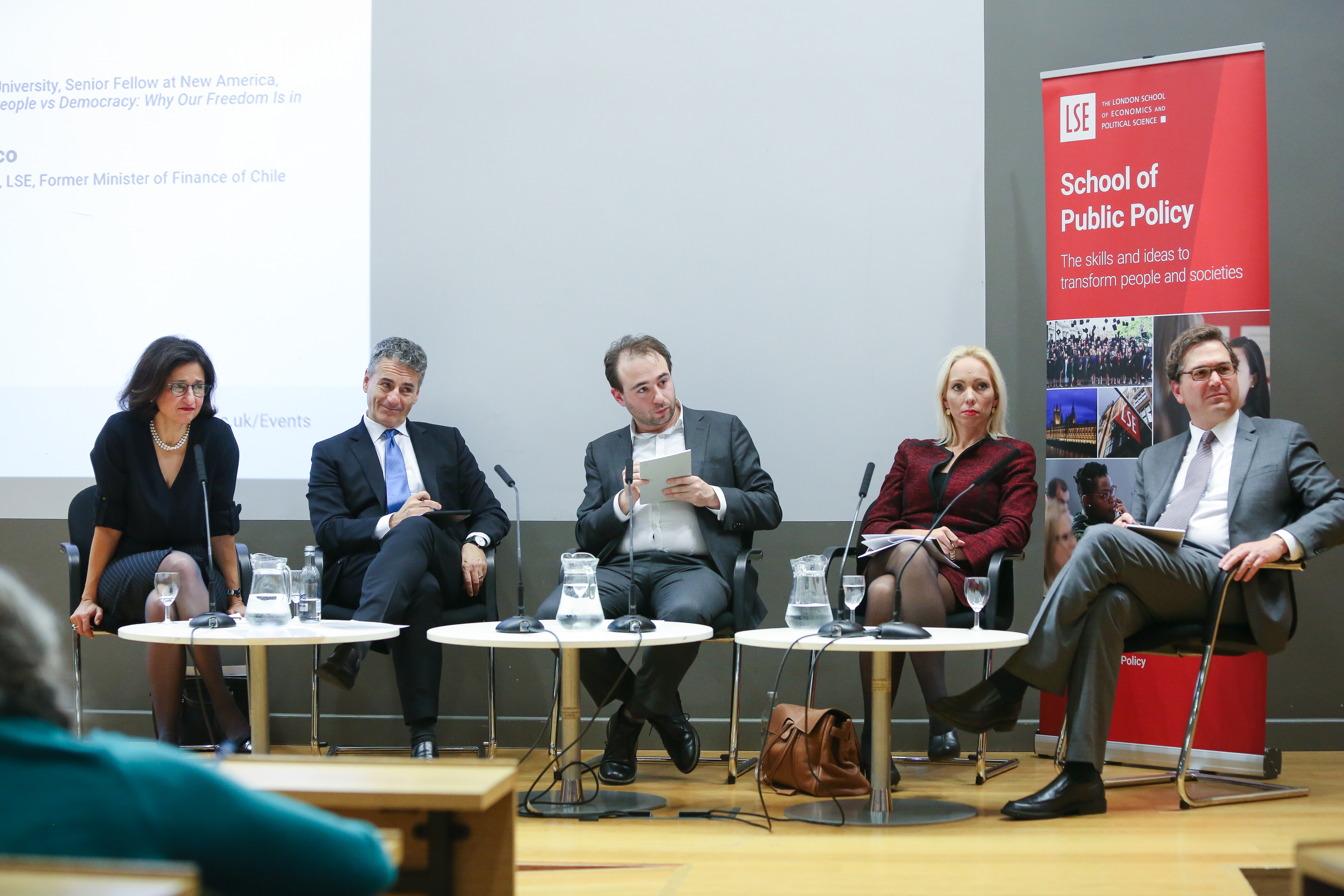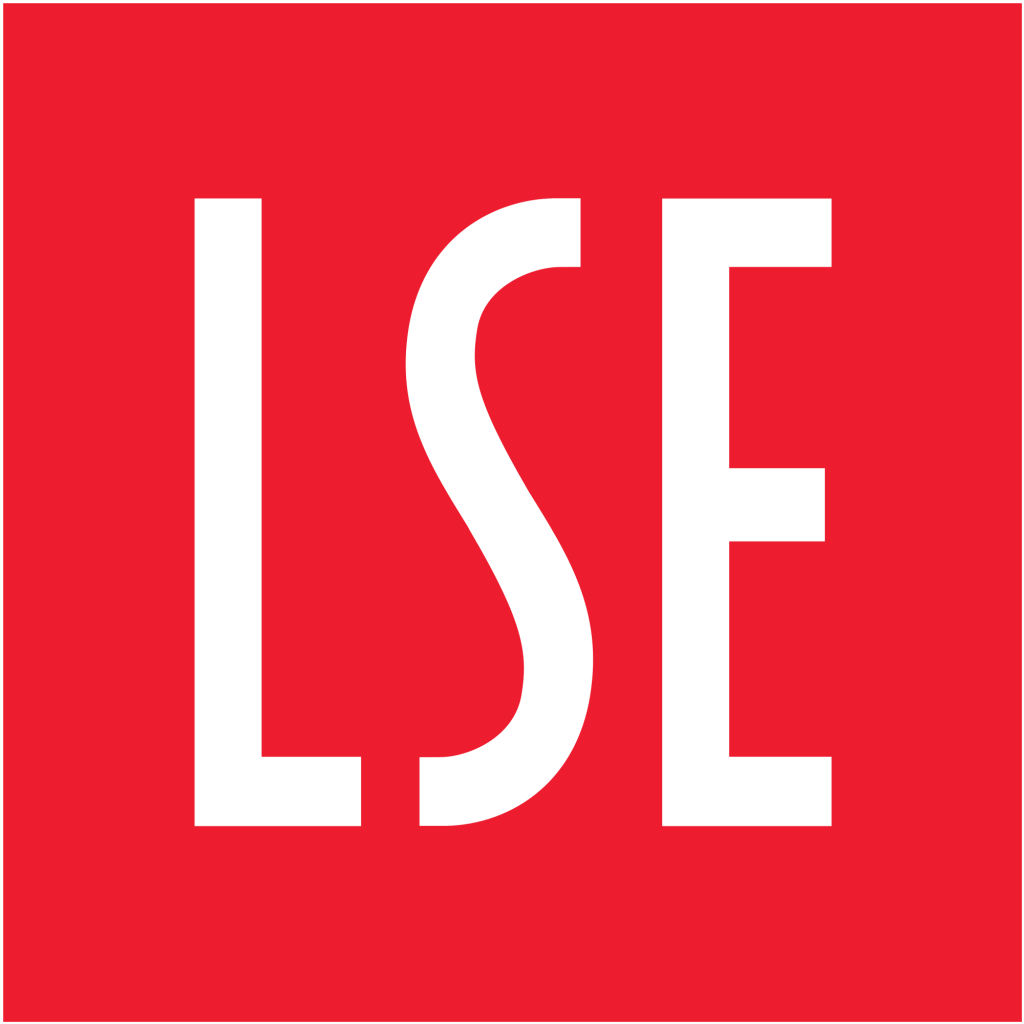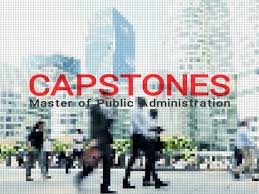LSE’s new School of Public Policy (SPP) recently held its launch event, featuring a thoughtful and challenging panel discussion on the rise of populism, and how LSE’s new public policy school can equip its students to reverse the trend. LSE’s Director, Dame Minouche Shafik and the SPP’s inaugural Dean, Professor Andres Velasco were joined by:
- Professor Sara Hobolt, Sutherland Chair in European Institutions and a faculty member of LSE’s Department of Government and the European Institute
- Yascha Mounk, Lecturer on Government at Harvard University, Senior Fellow at New America, columnist at Slate, and author of The People vs Democracy: Why Our Freedom Is in Danger and How to Save It
- Professor Jason Furman of Harvard’s Kennedy School of Government and Senior Fellow at the Peterson Institute for International Economics.

Panel members(left to right) Dame Minouche Shafik, Professor Andres Velasco, Yascha Mounk, Professor Sara Hobolt and Professor Jason Furman
Here are some of my key take-aways from the panel’s discussion.
It’s not the economy, stupid
The panel mostly agreed that populism is not an economic problem. Despite much hand-wringing and navel-gazing by liberals after Brexit and Trump’s election in 2016 about the failure of globalization to remain inclusive, and to “lift all boats” in its rising tide, both Professor Velasco and Professor Furman agreed that economic inequality wasn’t a sufficient explanation.
First, they argued, if looked at as a global trend, populism doesn’t appear more likely to grow in poor countries than in rich—if anything it’s the reverse.
Second, the US’s populist problem didn’t really emerge until 15 years after the most severe decline in manufacturing jobs in the country’s history. If economics was the full story, one might have expected a Trump-like phenomenon to emerge in the early 2000s.
Third, the language used by populists reveals an instinctive and emotional appeal to identity, rather than to wealth or redistribution. It points to outsiders—often in racial or national terms—and to disconnected elites who have lost touch with ordinary folk in order to better define who the insiders are, who the ‘real’ community is, and to create an urgent sense of the need to protect it from erosion or attack.
Fire, brimstone and rational centrist policies?
Professor Velasco spoke at length about how we must take more seriously the task of understanding this identarian appeal of populism. Populists have a way of cutting through the complexity of policy change to make the painstaking, grueling work of consensus-building and negotiation seem grubby, slow and weak. Instead populists promise to slice through the committees, the ‘lies’, the broken promises, the lackluster progress with sweeping radical changes and a re-establishment of national identity, around which economic growth and national pride will flourish. Liberals must understand the power of this sort of rhetoric, especially when set against the dry, technical, insider’s language of technocracy.
Articulating a patriotic liberalism
Perhaps most importantly, the panel reflected seriously on how to move forwards, and how to re-assert the liberal agenda. There was broad consensus around three prescriptions:
1) Treat people with greater respect. We must remain tolerant of different views, open-minded about different experiences, and guard militantly against retreat by policy and political elite into their ivory towers.
2) Acknowledge that the language and sometimes the practice of technocracy can alienate. It’s easy to forget that the precise and sterile laboratory of technocracy and the values-aggregating engine of democracy are actually often in tension, and that democracy should always come out the victor.
3) Finally, style matters. Liberals must learn from the success of populists to get better at building shared identities and stirring people’s sense of pride in their communities—and as Professor Velasco put it, crafting a ‘patriotic liberalism’.
A caution against narrative fitting
Before we got too comfortable with the global nature of the panel’s analysis, Professor Hobolt issued a welcome and wise plea for caution around narrative fitting. She pointed out that we should be more careful about the definition we use for populism – is it a stretch to compare the political forces that gave rise to Trump and Brexit to those that are fueling Orban, Erdogan or Duterte, or even Bolsonaro? Furthermore, should we even consider Trump and Brexit to be truly ‘populist’ outcomes? Brexit came off the back of a decade of Euroscepticism from mainstream conservative MPs and was called for by many members of cabinet in the lead up to the referendum. Although Trump is more credibly an outsider, he was also ultimately endorsed by the GOP. When a political movement comes from the very centre of established political institutions, is it still right to think of it as populism? Professor Hobolt went on to point out that the ‘rise’ of populism, to the extent that we can agree on a definition, may be more of a hiccup than a reckoning, at least in Europe. If we zoom out a little to the last century, Europe has never looked more liberal; Indeed, the French recently elected Macron over Le Pen, and the Swiss recently rejected a proposal put to them that would have given Swiss law precedence over international law and treaties.
The role of the LSE’s new School of Public Policy
Despite some debate about definitions, the panel agreed that modern public policy practitioners graduating from LSE’s new School of Public Policy need to know how to use evidence in a way that resonates with people. Given that public policy schools are a unique place to combine technical economics, political science, and political philosophy at a graduate level, the panel agreed that the SPP should focus on teaching students how to translate technical academic findings into actionable policy platforms that have traction in the real world. Arguing that liberal (in the institutional and historical sense, rather than the American partisan sense of the word) ideas are actually radical, and that they need re-articulating and protecting, Yascha Mounk went further, and called for public policy schools to avoid neutrality, and to make it their mission to actively promote liberalism.
Final thoughts
Articulating political values while remaining scientific with regards to evidence is a hard line to walk – there are good reasons for keeping academic enquiry separate from politics. But if the SPP is in the business of training future leaders not just future policy academics, then it needs to give students the tools to combine the two without threatening the integrity of our work. Teaching students what to do, as well as how and when to do it requires a sophisticated understanding of the difference between normative and positive endeavors.
Finally, it’s important to note that Trump, Bolsonaro, and Farage all campaigned on some iteration of ‘draining the swamp’: flushing out the perceived corruption, being suspicious of experts and elites with self-serving agendas, and restoring power to the people. It’s a powerful and resonating message, and for public policy schools to stay relevant, we must take heed of it. We need to continue to be more vigilant against corruption and rent-seeking, and more concerned than ever with the real-world impact of our work.
Author: Co-editor of the SPP blog and current MPA second year, Madeline Goldie





